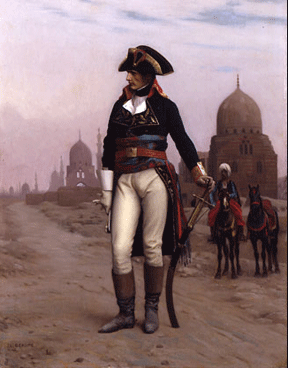
Painting by Jean-Léon Gérôme’s “Napoleon in Egypt,” 1867-68.
Please read the following quote:
“Gangs of thugs looting, as well as other hooligans, thieves, pickpockets, robbers, highwaymen, all having a field day. Relations between people ceased, and all dealings and business came to a standstill. The roads in the city became insecure, not to mention those outside it. Violence flared up in the countryside, and people began to kill each other. They stole cattle and plundered fields. They set fire to the barns and sought to avenge old hatreds and blood feuds, and so on.”
So who said this and what tragedy is being described? If you are thinking that this could be the post of an embedded journalist in Iraq or an Iraqi blogger looking out at the violence on the streets in the past couple of days, it would not be a surprise. Of course, this kind of atrocity-ridden rabble-ous melee has happened over and over again. When security goes down the tubes, violence almost always takes over. This is not because humans are evil by nature, but evil times draw out the worst in us all.
The excerpt above was written as an eye-witness account about events in Cairo in 1798. The author was ‘Abd al-Rahman al-Jabarti, an Islamic religious authority who wrote a chronicle of events about the invasion of Egypt by a Western power. His reflections, as a concerned historian over a traumatic political event in his native country, are available in English translation. As you might expect, the Egyptian al-Jabarti is appalled by the French incursion and the audacity of General Napoleon in claiming to be doing Allah’s will by driving the corrupt Mamluk rulers out of Egypt. Napoleon had the khutzpah (substitute whatever French word comes to mind) to issue a proclamation in Arabic (not very good Arabic, as al-Jabarti goes to great lengths to demonstrate) saying he was a better Muslim than the Mamluk overlords and was an enemy of Christianity. Al-Jabarti was not impressed, dismissing the French invaders as materialists who did not believe in God or any religion. “May God hurry misfortune and punishment upon them, may He strike their tongues with dumbness, may He scatter their hosts, and disperse them, confound their intelligence, and cause their breath to cease.” Strong words and strong feelings.
Following the sad events in Basra and Baghdad (and elsewhere in Iraq) the past few days, it is obvious that a contemporary Iraqi could look out on the clashes between the Mahdi Army militia and Iraqi military (not to mention the rather large body of American forces) and find these words of al-Jabati more than two centuries ago as ironically fitting for the rude reality facing Iraq today. As noted in Al-Jazeera and other news media, with reporters on the ground rather than spin doctors on Ersatz cable air, this fighting is intense and could escalate into the kind of killing the surge was hopefully mitigating.
It would be easy to read al-Jabarti’s text merely as those of a mad mullah expounding against the French invaders. Easy, but simplistic. Yes, the Egyptian shaykh saw through the ludicrous claims of French imperialism. But he also lamented, as shown in the quote above, the barbaric and immoral acts of his countrymen. Not long after Napoleon defeated the cowardly (for so al-Jabarti damns them) forces of the unpopular Mamluks (shades of Saddam Hussein?), there was a popular rebellion from the streets in Cairo. This led to the travesty of Napoleon shelling the holy site of al-Azhar, then entering with his troops and desecrating the mosque. But al-Jabarti, far more objective than one might suppose, has nothing but harsh words for the charlatan lying to the rabble that their religious scholars had ordered the killing of the French infidels. This fool, inciting people to violence against the French, is as odious as the French themselves. And for good reason. “They looted property held as deposits and trusts, raped the women and girls, and also plundered the Khân al-Milâyât (store for women’s outer garments), looting all its merchandise and whatever else was to be found… In this way their disgraceful acts increased and they did not think about the consequences continuing in this way all the night.” He continues to refer to these misguided zealots as “scoundrels and rogues.” In a way, these rioters are as much to blame for the eventual harm to al-Azhar’s mosque and respected religious school as the French themselves.
Is there a modern day al-Jabarti blogging about the fighting in Basra and Baghdad? No doubt. But perhaps all we need to do is read theses words from two centuries ago. Gangs of thugs all seem to look alike and certainly act alike.
[Note: The historian Juan Cole has written a book about Napoleon in Egypt and maintains an active blog on the topic.]